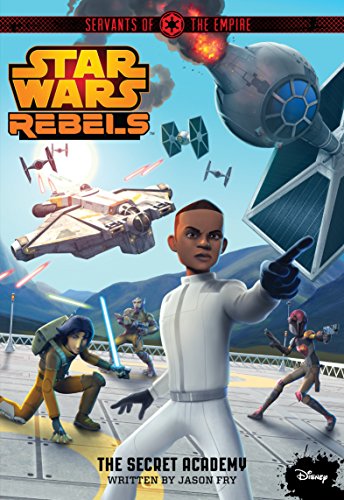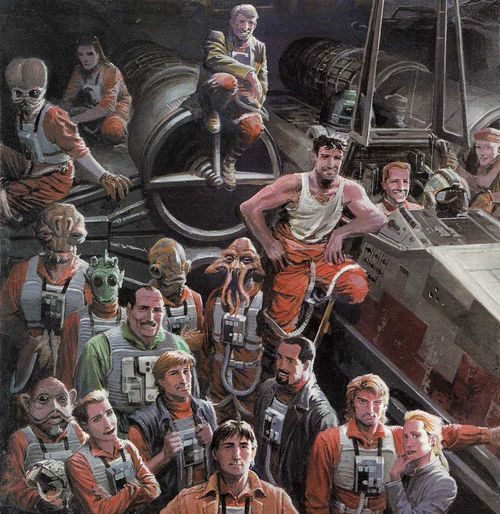 So this year, I didn’t get a formal press badge for NYCC. However, I spent my Sunday hanging around at the Del Rey booth, surrounded by my Star Wars friends, and it certainly got me thinking about the community that fandom has really become. Star Wars fandom has been greatly fractured over the last few years, but it still plays such a vital role in so many of our lives. We’ve all met amazing friends through fandom, and some of us have even met romantic partners that way. It’s such an important part of our lives, even if our perspectives and place in fandom change over the years. It’s more important than I expected, for one.
So this year, I didn’t get a formal press badge for NYCC. However, I spent my Sunday hanging around at the Del Rey booth, surrounded by my Star Wars friends, and it certainly got me thinking about the community that fandom has really become. Star Wars fandom has been greatly fractured over the last few years, but it still plays such a vital role in so many of our lives. We’ve all met amazing friends through fandom, and some of us have even met romantic partners that way. It’s such an important part of our lives, even if our perspectives and place in fandom change over the years. It’s more important than I expected, for one.
One of the biggest changes in my relationship to fandom has been becoming a blogger. When your hobby also becomes something of a part-time job, it really changes how you think about it, and that’s likely true for anyone who ends up prominent in any fandom. A lot of us are probably old enough to remember the days of LiveJournal fandom, in which famous fanfic writers did end up with quite a following and substantial name recognition. We all probably remember a time when someone prominent in a fandom notices us; I definitely spent a few minutes slightly incredulous when I was first asked to write for this site. And here I still am, spending my spare time writing analysis about a fictional universe.
Fandom brings people together. We all have friends we’ve met because of fandom, and for those of us who are frequent con-goers, we have our groups of con friends who we always plan to see at the annual conventions. We all have stories of people meeting their best friends and significant others through fandom, and that’s no longer considered unusual. That kind of bringing people together is one of the many reasons I’ve stayed in fandom for as long as I have. Read More
 Star Wars Battlefront: Twilight Company is not your typical videogame tie-in. Even though it borrows part of its title from a soon to be released FPS game (that promises to be quite spectacular), Twilight Company works on its own without the need of the Battlefront crutch. The novel is pure military sci-fi. It’s less glamorous than the Rogue Squadron novels and more gritty than the Republic Commando series. Our main characters are not starfighter pilots or special forces commandos: they are the infantry, the people fighting the Galactic Civil War in the frontlines. Most importantly, Twilight Company gives us a hard look at what being a soldier in the Rebel Alliance during a period of open conflict is like and boy, is it engaging.
Star Wars Battlefront: Twilight Company is not your typical videogame tie-in. Even though it borrows part of its title from a soon to be released FPS game (that promises to be quite spectacular), Twilight Company works on its own without the need of the Battlefront crutch. The novel is pure military sci-fi. It’s less glamorous than the Rogue Squadron novels and more gritty than the Republic Commando series. Our main characters are not starfighter pilots or special forces commandos: they are the infantry, the people fighting the Galactic Civil War in the frontlines. Most importantly, Twilight Company gives us a hard look at what being a soldier in the Rebel Alliance during a period of open conflict is like and boy, is it engaging.
 As the Journey to The Force Awakens campaign kicked off on September 4th, one of the many questions readers started asking was: why is the Empire falling apart so quickly? The obtuse answer is that this is what the story demands, and we’ll learn the full reasons on December 18th. But many of us thought the war would last far longer than in the Expanded Universe, where the Empire was driven out of the Core Worlds as early as five years after Return of the Jedi. Surely this time the war would truly rage on for many many years: but that’s not what happened. Suddenly, the Empire of the EU seemed a lot more solid and formidable. Folks speculated as to the reasons why, such as the collapse of central authority, the unwillingness of the Navy to waste time protecting a symbolic world like Coruscant, defections to the New Republic, etc.
As the Journey to The Force Awakens campaign kicked off on September 4th, one of the many questions readers started asking was: why is the Empire falling apart so quickly? The obtuse answer is that this is what the story demands, and we’ll learn the full reasons on December 18th. But many of us thought the war would last far longer than in the Expanded Universe, where the Empire was driven out of the Core Worlds as early as five years after Return of the Jedi. Surely this time the war would truly rage on for many many years: but that’s not what happened. Suddenly, the Empire of the EU seemed a lot more solid and formidable. Folks speculated as to the reasons why, such as the collapse of central authority, the unwillingness of the Navy to waste time protecting a symbolic world like Coruscant, defections to the New Republic, etc. Picture two people, waking up on an average morning.
Picture two people, waking up on an average morning.